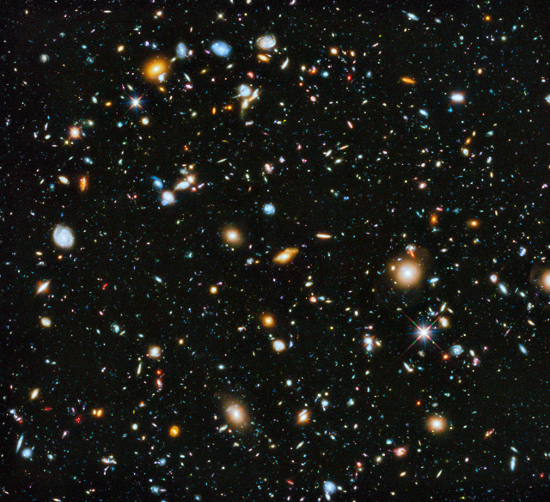During the past few decades we have discovered that at least from a physical perspective, humans are but a speck of dust in the grand scheme of the universe.
We live on a small planet which revolves around a very ordinary star. The Kepler space observatory has shown us that our Milky Way galaxy is teeming with about a billion Earth-size planets orbiting their parent stars in the Habitable Zone (that not-so-cold-not-so-hot region that allows for liquid water to exist on the planet's surface). The Hubble Space Telescope has revealed that there are a few hundred billion galaxies in the observable universe (Figure 1 shows the Hubble Ultra Deep Field 2014). That is not all. Even the stuff we are made of -- ordinary (baryonic) matter -- constitutes less than 5% of the cosmic energy budget. About 25% is in the form of dark matter -- matter that neither emits nor absorbs any light, and about 70% is in the form of dark energy -- a mysterious, smooth energy that may represent the energy of empty space.

Figure 1. The Hubble Ultra Deep Field 2014. A deep image of a tiny piece of sky, taken with the Hubble Space Telescope. Almost every point of light in this image represents a galaxy with about a hundred billion stars like the Sun. Credit: NASA, ESA, H.Teplitz and M. Rafelski (IPAC/Caltech), A. Koekemoer (STScI), R. Windhorst (ASU), Z. Levay (STScI).
And if that is not enough, some recent speculations suggest that even our entire universe may be just one member of a huge ensemble of universes -- a "multiverse" -- consisting of some 10 (that is, 1 followed by 500 zeros) universes.
Taken at face value, these facts may seem depressing for our sense of importance.
I would like to suggest, however, that in many ways humans still occupy a central role on the cosmic scene.
First, almost all the atoms in our bodies were forged in the nuclear furnaces at the centers of stars. The early universe was composed only of hydrogen, helium, and tiny amounts of a few other light atoms. All the atoms of carbon, oxygen, iron, and so on, that are necessary for life, were fused either in stellar cores or in massive stellar explosions. In this sense, not only are we in the universe, the universe is inside us.
Second, to date, the Earth is the only place in the universe where we have discovered life, and intelligent life in particular.
So at least for now, this makes us very special. But it's more than that. The famous physicist Enrico Fermi wondered once "where are they?"
In other words, if our Galaxy truly contains many intelligent civilizations, some of which may be ahead of us by a billion years, how is it possible that we have not seen any sign of them yet? Nobody knows the answer to this so-called "Fermi Paradox," but one of the speculations is that there exists some bottleneck to the emergence of intelligent civilizations, and that this bottleneck could have either been in our past, or we will hit upon it in the future. That is, either to reach our stage is extremely hard, or there is something that prevents intelligent civilizations from being long-lived. If either of these two speculations is correct, it puts a heavy burden of responsibility on humanity's shoulders. In the first case, we may be one of very few (or the very first!) to have made it to the "intelligent" phase.
In the second case, we will have to prove that maybe we can survive what others have not.
The third reason that makes humanity special, in spite of its insignificance from a purely physical perspective, is the human curiosity and knowledge. When Copernicus demoted the Earth from its central place in the solar system, it was a human who discovered that.
When astronomer Harlow Shapley showed at the beginning of the last century that the solar system was not at the center of the Milky Way (it is about two thirds of the way out), that again represented a human discovery. The same was true for the discoveries of billions of other galaxies, of dark matter and of dark energy -- all human discoveries!
Put differently, our cosmos has expanded JUST AS FAST AS THE HORIZONS OF OUR KNOWLEDGE.
This is why we are truly important.